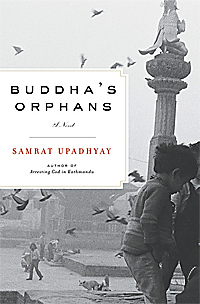Buddha’s Orphans 
Samrat Upadhyay
Houghton Mifflin Harcourt, July 2010
448 pp., $26.00 cloth
At first blush, Buddhism might seem hostile to fiction. Our practice asks us to reject all illusions, allowing ourselves to see things only as they are. The dharma offers us a chance, even a duty, to rouse from our own waking dreams. Against this lifelong purpose, immersing in the fictional dream of some faraway author hardly seems like progress.
And yet Buddhism itself begins with a simple story. A young boy, born to a life of privilege under the most auspicious signs, rejects the lavish luxuries of his palace to begin the great spiritual quest that launched our faith. To modern-day Buddhists, this founding tale remains paradoxically both absolutely essential and wholly irrelevant. Essential because the Buddha’s example carries the promise that enlightenment is possible in our lifetime. Irrelevant because, in the end, we must each navigate our life with only the fruits of our own practice as our true guides.
Samrat Upadhyay’s Buddha’s Orphans begins with a sort of Buddha’s life in reverse. In the early chapters, we watch an orphan boy reject poverty for relative affluence in twentieth-century Nepal, not far from the Buddha’s own ancestral home. Raja—no prince, despite his regal name—bears witness to much of Nepal’s tumultuous recent history as he grows up in a comfortable, middle-class Kathmandu home. Some Tricyclereaders may well recognize themselves in the bedraggled Western seekers Raja meets in the city’s backpacker haunts, but by the end of this sprawling, multi-generational novel, Raja has not found his solace in an enigmatic guru or exotic spiritual practice. Instead, Raja’s own peace emerges from the romantic love he shares with Nilu, a childhood friend, and the unconventional family life they build together.
Would the Buddha read a book like Buddha’s Orphans? Literature strives to provide an authentic glimpse into the inner life of another being, a momentary insight into the human truth of suffering, impermanence, and liberation. At the same time, fiction can offer a tempting—and perhaps sometime necessary—respite from the difficult work of finding those truths within ourselves. Upadhyay’s skillful telling of Raja and Nilu’s losses and loves, their politics and their passions, gives us some of each.
Thank you for subscribing to Tricycle! As a nonprofit, we depend on readers like you to keep Buddhist teachings and practices widely available.